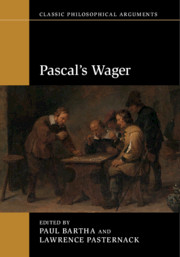Book contents
- Pascal’s Wager
- Classic Philosophical Arguments
- Pascal’s Wager
- Copyright page
- Contents
- Figures and Tables
- Contributors
- Acknowledgments
- Introduction
- Part I Historical Context and Influence
- Part II Assessment
- Part III Extensions
- 11 The Arbitrary Prudentialism of Pascal’s Wager and How to Overcome It by Using Game Theory
- 12 Pascal’s Wager and the Dynamics of Rational Deliberation
- 13 Infinity in Pascal’s Wager
- 14 Pascal’s Wager and Imprecise Probability
- 15 Do Infinitesimal Probabilities Neutralize the Infinite Utility in Pascal’s Wager?
- Bibliography
- Index
13 - Infinity in Pascal’s Wager
from Part III - Extensions
Published online by Cambridge University Press: 28 September 2018
- Pascal’s Wager
- Classic Philosophical Arguments
- Pascal’s Wager
- Copyright page
- Contents
- Figures and Tables
- Contributors
- Acknowledgments
- Introduction
- Part I Historical Context and Influence
- Part II Assessment
- Part III Extensions
- 11 The Arbitrary Prudentialism of Pascal’s Wager and How to Overcome It by Using Game Theory
- 12 Pascal’s Wager and the Dynamics of Rational Deliberation
- 13 Infinity in Pascal’s Wager
- 14 Pascal’s Wager and Imprecise Probability
- 15 Do Infinitesimal Probabilities Neutralize the Infinite Utility in Pascal’s Wager?
- Bibliography
- Index
Summary
- Type
- Chapter
- Information
- Pascal's Wager , pp. 260 - 277Publisher: Cambridge University PressPrint publication year: 2018
- 1
- Cited by



